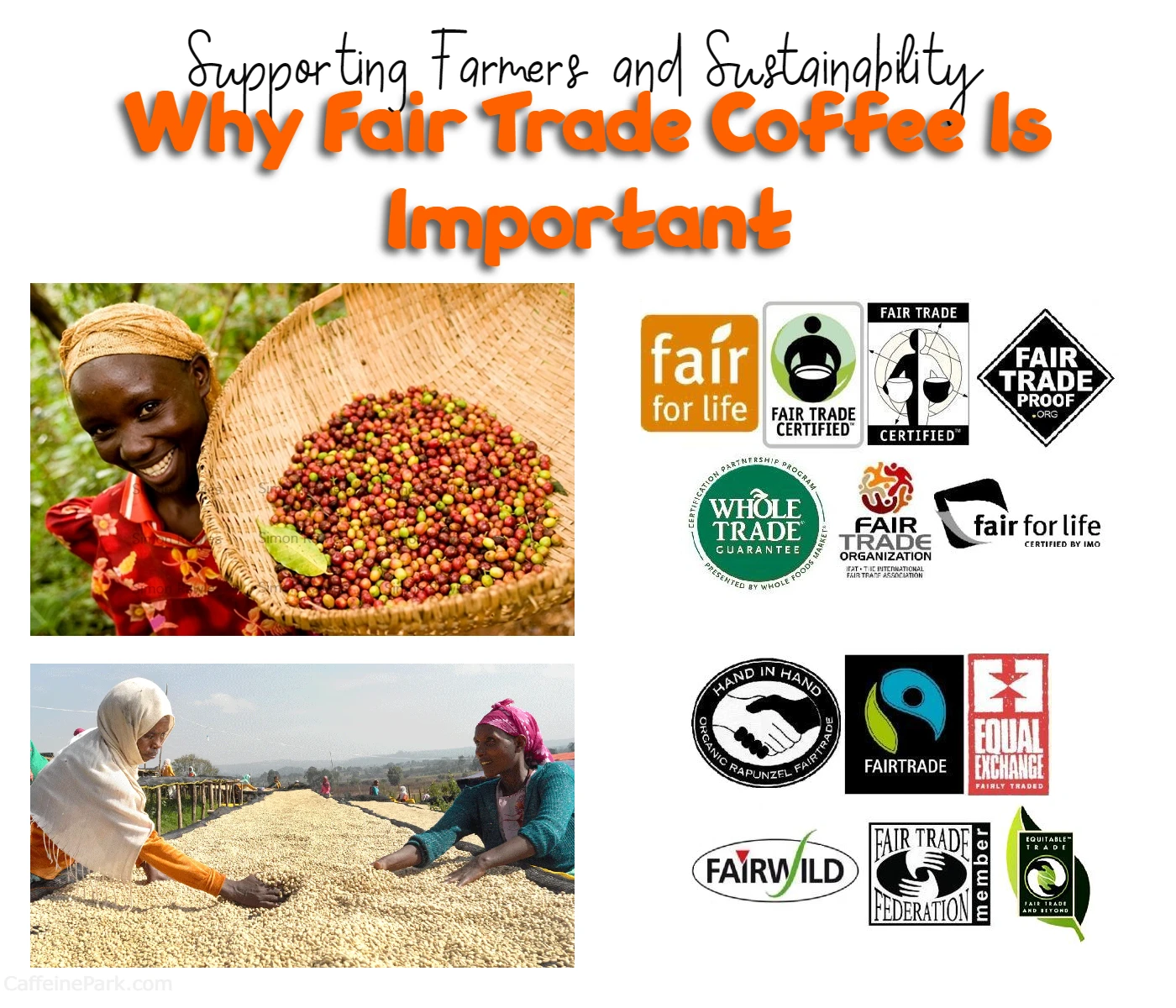Why Fair Trade Coffee Is Important

Hey there, coffee lovers! Have you ever stopped to think about where your coffee comes from and who grows it? The truth is, the coffee industry can be a harsh and unfair place for many farmers around the world. That’s where fair trade coffee comes in. By choosing fair trade coffee, you can help ensure that coffee farmers are paid a fair price for their beans, that workers are provided with safe and healthy working conditions, and that coffee is produced in an environmentally sustainable way.
But why is fair trade coffee so important? For starters, the coffee industry is a major source of income for many countries, particularly in Latin America, Africa, and Asia. However, despite the high demand for coffee, many farmers struggle to make ends meet. This is because the coffee market is dominated by a few large corporations that often pay farmers very low prices for their beans. Fair trade certification helps ensure that farmers are paid a fair price for their coffee, which can help improve their standard of living and support their communities.
Not only does fair trade coffee help support farmers and their families, but it also has a positive impact on the environment. Many coffee farms use unsustainable farming methods that can lead to deforestation, water pollution, and soil degradation. Fair trade certification requires that coffee be produced in an environmentally sustainable way, which can help protect wildlife habitats and promote sustainable agriculture. So the next time you’re sipping on your morning cup of coffee, consider choosing fair trade and supporting a more just and sustainable coffee industry.
Introduction
Coffee is one of the most beloved beverages worldwide, with millions of people enjoying a hot cup of joe every day. It’s a source of comfort, energy, and joy for many, but it’s also a major global commodity that impacts the lives of countless people around the world. In recent years, the concept of fair trade coffee has gained popularity and importance, as consumers have become more aware of the social and environmental impacts of their purchasing decisions. So what is fair trade coffee, and why is it so important? Let’s take a closer look.
What is Fair Trade Coffee?
Fair trade coffee is coffee that has been certified by an independent third-party organization, such as Fairtrade International, as meeting certain social, economic, and environmental standards. These standards include fair prices for farmers, safe and healthy working conditions, environmental sustainability, and community development. When you buy fair trade coffee, you can be assured that the farmers who grew the beans received a fair price for their product and that the coffee was produced in a way that is sustainable and ethical.
Fair Trade Coffee Certificates
Fair trade coffee is certified by various organizations that set standards for social, economic, and environmental sustainability. These organizations certify coffee that meets certain criteria related to fair prices for farmers, safe and healthy working conditions for workers, and environmentally sustainable farming practices.
Some of the most well-known fair trade certifications for coffee include:
- Fairtrade International: Fairtrade International is a global organization that sets standards for fair trade certification. Its standards focus on fair prices for farmers, safe and healthy working conditions for workers, and environmental sustainability.
- Rainforest Alliance: The Rainforest Alliance is an international nonprofit organization that works to promote sustainability and protect wildlife habitats. Its certification for coffee focuses on environmental sustainability and social responsibility.
- UTZ: UTZ is a certification program that focuses on sustainability in the coffee industry. Its standards focus on social, economic, and environmental sustainability.
- Smithsonian Bird-Friendly: The Smithsonian Bird-Friendly certification is awarded to coffee that is grown in a way that supports bird habitats and biodiversity. Its standards focus on shade-grown coffee that is produced without harmful pesticides.
By looking for coffee that has been certified by one of these organizations, you can ensure that you are purchasing coffee that meets certain standards for fair trade practices and sustainability. Additionally, many coffee companies have their own fair trade certifications or commitments to fair trade practices and sustainability, so it is worth checking with the retailer to see if they have a commitment to these practices.
Quick Chart
Benefits of Fair Trade Coffee:
- Farmers are paid a fair price for their beans
- Workers have safe and healthy working conditions
- Coffee is produced in an environmentally sustainable way
- Supports small-scale farmers and promotes sustainable agriculture practices
- Helps prevent exploitation and promote human rights
- Promotes transparency and accountability throughout the supply chain
Impact of Fair Trade Coffee:
- Improved standard of living for farmers and their communities
- Protection of wildlife habitats and promotion of sustainable agriculture
- The more resilient and diverse coffee industry
- Positive impact on the environment and future generations
- More just and sustainable coffee industry
- Transparency and accountability in the supply chain
Choosing Fair Trade Coffee:
- Look for coffee that has been certified by a fair trade organization
- Check with the retailer to see if they have a commitment to fair trade practices
- Support companies that have a commitment to fair trade practices and sustainability
- Make a positive impact on the world and support a more just and sustainable coffee industry.
Why is Fair Trade Coffee Important?
There are several reasons why fair trade coffee is important, both for the people who grow coffee and for the environment.
Fair Prices for Farmers
One of the main goals of fair trade is to ensure that farmers receive a fair price for their coffee. This is especially important in countries where the coffee industry is dominated by large corporations that often pay farmers very low prices for their beans. When farmers are paid a fair price for their coffee, they are able to invest in their farms, their families, and their communities. This can lead to improved living conditions, better access to education and healthcare, and increased economic stability.
Safe and Healthy Working Conditions
Another key aspect of fair trade is ensuring safe and healthy working conditions for coffee farmers and workers. Many coffee farms are located in developing countries where labor laws may be weak or poorly enforced. This can lead to exploitation, unsafe working conditions, and other abuses. Fair trade certification requires that farmers and workers be provided with safe and healthy working conditions, including protective equipment, training, and access to healthcare.
Environmental Sustainability
The production of coffee can have significant environmental impacts, including deforestation, water pollution, and soil degradation. Fair trade certification requires that coffee be produced in a way that is environmentally sustainable. This can include using organic farming methods, conserving water, and protecting wildlife habitats. By choosing fair trade coffee, you can support sustainable agriculture and help protect the environment.
Community Development
Fair trade certification also requires that coffee producers invest in their local communities. This can include supporting education and healthcare programs, building infrastructure such as roads and schools, and providing training and resources to help farmers improve their practices. By supporting fair trade coffee, you can help promote community development and improve the lives of people in coffee-growing regions around the world.
How to Find Fair Trade Coffee
If you’re interested in buying fair trade coffee, there are several ways to find it. Many coffee shops and grocery stores now carry fair trade coffee, and you can also purchase it online. Look for the Fairtrade International certification logo on the packaging to ensure that the coffee you’re buying meets fair trade standards.
Conclusion
In conclusion, fair trade coffee is an important way to support the people and the environment behind the coffee we enjoy every day. By choosing fair trade coffee, we can help ensure that coffee farmers receive fair prices for their products, that workers are provided with safe and healthy working conditions, and that coffee is produced in an environmentally sustainable way. We can also help promote community development in coffee-growing regions around the world. So the next time you’re enjoying a cup of coffee, consider choosing fair trade and supporting a more just and sustainable coffee industry. Together, we can make a difference in the lives of coffee farmers and their communities.
Facts
- Fairtrade coffee ensures that farmers are paid a fair price for their beans. This can help improve their standard of living and support their communities.
- Fairtrade certification requires that coffee is produced in an environmentally sustainable way, which can help protect wildlife habitats and promote sustainable agriculture.
- The coffee industry is a major source of income for many countries, particularly in Latin America, Africa, and Asia. However, despite the high demand for coffee, many farmers struggle to make ends meet due to the low prices paid by large corporations.
- Fair trade coffee helps to support small-scale farmers and promote sustainable agriculture practices, which can lead to a more resilient and diverse coffee industry.
- Fairtrade certification also ensures that workers have safe and healthy working conditions, which can help prevent exploitation and promote human rights.
- Choosing fair trade coffee can help you make a positive impact on the world and support a more just and sustainable coffee industry. By supporting fair trade practices, you can help ensure that coffee farmers and their communities are treated fairly and that the environment is protected for future generations.
- Fairtrade certification also requires transparency and accountability throughout the supply chain, which can help prevent fraud and ensure that the coffee you purchase meets certain social, economic, and environmental standards.
FAQs
Fair trade coffee is important for several reasons. Firstly, it helps ensure that coffee farmers are paid a fair price for their beans, which can help improve their standard of living and support their communities. Additionally, fair trade certification requires that coffee is produced in an environmentally sustainable way, which can help protect wildlife habitats and promote sustainable agriculture.
You can support fair trade coffee by looking for coffee that has been certified by a fair trade organization such as Fairtrade International or the Rainforest Alliance. These certifications ensure that the coffee you purchase meets certain standards related to social, economic, and environmental sustainability. Additionally, you can choose to purchase from companies that have a commitment to fair trade practices and sustainability.
Fair trade coffee can be more expensive than conventional coffee, as it often involves paying farmers a higher price for their beans. However, the additional cost is often worth it for the positive impact it has on farmers and their communities, as well as the environment.
Fair trade coffee is available at many grocery stores, coffee shops, and online retailers. Look for coffee that has been certified by a fair trade organization, or check with the retailer to see if they have a commitment to fair trade practices.
Read More:





